The Journals of Ayn Rand Read online
Page 14
His whole attitude toward himself, life and other men is completely clear to him. He does not even have to ponder about it—it is his very nature to be clear, consistent and logical about everything. His main policy in life is to refuse, completely and uncompromisingly, any surrender to the thoughts and desires of others. He wants to be an architect. He knows what he thinks of his work and what and how he will create. He expects others to accept his creation. Not because he needs their acceptance, but merely because they will be the ones to live in and use his buildings. He does not consider his work as concerned with the benefit and convenience of others. They are merely a convenience for his work. He does not build for people. People live for his buildings. He does not expect or wish admiration: he merely expects a humble bow to his superior spirit and its creation—because such is the nature of things and mere justice.
If he cannot get the right to do the work as he wants it done—well, then, he’ll take a fifteen-dollar job as a common worker, and wait and work for his chance. Because the rewards of success as such—money, ease and fame—mean nothing whatever to him; his life has to be real, his life is his work, he will do his work as he wants it done, the only way he can enjoy it—or not at all, and perish in the battle. Because the second-hand consolations most people get out of life have no meaning for him, he will not compromise by building inferior buildings, nor by pretending adherence to the prejudices of those in power to gain their favors and their jobs. He will be himself at any cost—the only thing he really wants of life. And, deep inside of him, he knows that he has the ability to win the right to be himself. Consequently, his life is clear, simple, satisfying and joyous—even if very hard outwardly.
He is in conflict with the world in every possible way—and at complete peace with himself. And his chief difference from the rest of the world is that he was born without the ability to consider others. As a matter of form and necessity on the way, as one meets fellow travelers—yes. As a matter of basic, primary consideration—no. And the whole tone of his life is set by that one idea, one feeling—he is “a reason unto himself.”
If he chooses the harder way, it is not through stupidity, stubbornness or a desire to be a martyr; it is merely because he knows he can make his way in the manner he pleases and will make it, and because he prefers his manner of making it. He has a tremendous, unshatterable conviction that he can and will force men to accept him, not beg and cheat them into it. He will take the place he wants, not receive it from others. Consequently, the profound serenity, joy, grandeur of his entire life and whole being.
His emotions are entirely controlled by his logic. Or rather—they are one and inseparable, with the emotions following the logic. (Show how this is possible.)
His whole philosophy: pride in oneself, confidence in oneself, placing one’s life and fate above all, but only the kind of life one wishes.
Religion—none. Not a speck of it. Born without any “religious brain center.” Does not understand or even conceive of the instinct for bowing and submission. His whole capacity for reverence is centered on himself. Needs no mystical “consolation,” no other life. Thinks too much of this world to expect or desire any other.
Politics—interested only in not being interested in politics. Society as such does not exist for him. Other people do not interest him. He recognizes only the right of the exceptional [man] (and by that he means and knows only himself) to create, and order, and command. The others are to bow. [Here we see a remnant of the Nietzscheanism prominent in The Little Street. For AR’s mature view, see “Man’s Rights ” in the Virtue of Selfishness.]
Ethics—only a code of his own, and only because he wants it. Doesn’t know what the word “duty” means. Plays straight—because he would feel contempt for himself if he were to sneak and lie. Says what he means—whether others like it or not. He is not concerned with their liking it. They will have to accept it. His life and work come above all—nothing and no one can interfere, or even be considered beside it.
Sex—sensuous in the manner of a healthy animal. But not greatly interested in the subject. Can never lose himself in love. Even his great and only love—Dominique Wynand—is not an all-absorbing, selfless passion. It is merely the pride of a possessor. If he could not have her, it would not break him or affect him very deeply. He might suffer—in his own indifferent way, a suffering that can never reach deep enough to obscure life.
His attitude toward Dominique is not: “I love you and I am yours.” It’s: “I love you and you are mine.” It is primarily a feeling of wanting her and getting her, without great concern for the question of whether she wants it. Were it necessary, he could rape her and feel perfectly justified. Needless to say, it is she who worships him, and loves him much more than he loves her. He is the god. He can never become a priest. She has to be the priestess. Until his meeting with Dominique, he has had affairs with women, perfectly cold, emotionless affairs, without the slightest pretense at love. Merely satisfying a physical need and recognized by his mistresses as such.
Ambition—see life. His whole being. Not even recognized by him as ambition. Merely his natural behavior, the only way he could be and act.
His manner is one of profound, inexorable calm. A strong kind of calm. Nothing can really arouse him—at least not outwardly. A slow, deliberate manner of speaking. Precise, unhurried movements. Laughs seldom. Does not joke. When he does—it is merely a quiet, indifferent kind of sarcasm. A man so far above men that nothing can really reach him. Never an emotional outbreak. Never loses control of himself.
And yet—a flaming intensity of feeling for his work and creation. And for life in general. A flame reserved only for himself. No one is ever to see, guess or witness it. And yet—its radiance is ever-present, in his indifferent calm itself, a radiance felt by all. Suffering makes him merely tenser and harder. A great deal of cruelty toward himself. And consequently toward others. Does not recognize suffering as such, or grant it any privileges and considerations. By the same token, he will never inflict unnecessary suffering or cruelty upon others. But when necessary, he will do it without even noticing it, without a shudder or a hint of hesitation.
The book is the story of Howard Roark’s triumph. It has to show what the man is, what he wants and how he gets it. It has to be a triumphant epic of man’s spirit, a hymn glorifying a man’s “I.” It has to show every conceivable hardship and obstacle on his way—and how he triumphs over them, why he has to triumph.
These obstacles, of course, can come from only one source: other men. It is society, with its boggled chaos of selflessness, compromise, servility and lies, that stands in the way of Howard Roark. It is every conceivable form of “second-hand living” that fights him, that tries to crush him as only a mob can crush—and fails in the attempt. To every second-hand creature he stands as a contrast, a reproach and a lesson.
We follow him from graduation as an architect to his ultimate, highest, complete victory. On the way, there are three main obstacles to face him: professional, economical, emotional. Professionally, it is the natural opposition of the mob to genius: total lack of understanding of his ideas, petty jealousies, resentment of the strange and the new, the stubborn stupidity of conservatism, the “social” angle of refusing opportunity to one who so totally lacks the social [ability of] boot-licking. As a consequence, [he endures] economical hardships, years of struggle with obscure jobs, poverty, silent, grim, relentless work. Every economical humiliation that society knows how to inflict. Emotionally, his first love is thwarted and denied—because of his unconventional, uncompromising attitude (Vesta).
February II, 1936
Peter Keating
Medium height, slender, graceful. Too graceful, with the studied, perfect, too soft and fluent grace of a ballet dancer. Carries himself erect, a deliberate erectness that seems a living illustration of the good, conventional “chin up” motto. Very pretty hands, always perfectly groomed. Always well dressed, well groomed and suggesting the manner of a fashion-plate, even in cheap clothes. A long, rather small, oval-shaped head, with a certain classical perfection in the shape of the skull. Long, narrow, pale face and attractive, almost feminine smooth skin, with a delicate, wax-like, transparent and milky texture. Long, thin nose and a very small mouth, delicate, flower-like and pretty, inclined to pout in a “bee-stung” manner, a mouth that would be small and pretty even on a girl. Dark, well-shaped eyes, alive, alert and softly lustrous. Obviously smart eyes, not deep or intelligent, but smart. Well-shaped eyebrows. Rather small, but well-shaped and pale forehead. Very black hair, set in a perfect, natural wave with soft, small ringlets in front. A rather high-pitched voice, softened by a studied, deliberate touch of kindly, velvet smoothness. An unnatural smile, soft, kindly, gentle and too friendly, considered fascinating and charming by all but the most discriminating ones. An unpleasant, insincere laughter, pitched on a high, oily, blurred hiccough sound, inclined to run into giggling.
Attitude toward life. Vanity grown out of all proportions. A vanity expressed in only one manner: to convince others of his superiority. Never a thought given to how he himself feels about things or values them; always—what others will think of him; and an overwhelming, burning anxiety to have them feel envy. All this never thought out or realized; just a blind, compelling instinct. This instinct has trained him to perfection in the ability to seize upon every thought and circumstance as helpful or detrimental to his main end. A lightning-like, instinctive, unreasoning ability to seize upon every possible advantage to his goal, long before his mind points out to him just where and what that advantage may be.
No philosophy of life ever thought out. No feeling of need for one. Never given to much abstract thinking. No such thing as peace with himself, since even the idea of any “se
lf” to consider has never occurred to him. No internal strife to consider for a long time, and when it does come it is too late, since the strife and the realization of its possibility both come at the same time.
Consequently, no convictions of any kind on any subject whatever. A blind, stubborn idea that convictions are useless and unnecessary. Fooled himself long ago, before he could realize that he was fooling himself, into the belief that his superiority lay precisely in his freedom from the bounds of convictions. Only an instinctive, subconscious resentment and impatient annoyance with those he considers to be “idealists,” left in him as a reminder of his unrealized, but subconsciously felt inferiority. This drives him, in self-protection, into a bitter, vicious resentment of men “with ideas.”
His main principle: “don’t take anything seriously.” A cheap cynicism and iconoclastic fury against everything high, noble and exceptional parade under the cloak of a “sense of humor,” “practical common sense,” and “keeping your feet on the ground.” Defending as “reality” all that he wishes reality to be.
February 12, 1936
[Peter Keating has] an invisible habit of belittling, mocking and dragging down everything high. He greatly enjoys “debunking” biographies of famous men and everything that tends to prove that great men were “only human.” Loves to insist that “we’re all brothers under the skin.” Has accepted as a faith, without thought or conviction behind it, the glorification of the so-called “human element”: the equality of men, the average good fellow, kindness, patience, tolerance, good neighborly feelings, love of children, home, family, etc. (Such convictions are not dangerous to his vanity, since they belong to the inferior man.) Doesn’t really mean or believe it, but is convinced that he believes it. Abstractly, of course. His “convictions” and his actions are things quite apart and the incongruity never occurs to him or bothers him.
He is as dishonest with himself as he is with others. His great motto: “If anyone has a car, I want two cars. If anyone has two cars, I want three cars. And I want to be sure they know it.” Has selected architecture merely because he thinks it will give him a great chance at his kind of “success.” No real love or talent for the work. Would have selected street-cleaning or shoe-mending with an equal pleasure, if it promised more advancement.
Attitude toward men. A mob man at heart. Completely gregarious. Has no satisfaction or interest in himself, consequently cannot stand to be alone. Prefers and selects inferior people among whom he can shine. Talks a great deal about the “communal spirit,” but sees to it that he is always the leader of any “commune.” Always plays up to others and revels in his great popularity. Never expresses a definite opinion on any subject, even the weather. Always sits on the fence. Calls it diplomacy. Acts as if each new man he meets is his greatest friend and the most interesting person in the world. Listens with immense interest to everyone else’s troubles. Never remembers a word of it. Always ready and delighted to help others—and says so. Never forgets to mention past favors he has rendered. Loves to take credit for the achievements of those he has helped. Fools himself with believing that he is sincere in his altruism. Doesn’t realize that it is caused by the subconscious instinct that tells him this altruism will help him a great deal in his cause, his vanity, in the opinions of others. But he will never lift a finger if helping another would really cost him anything or if there is no glory in such helping. And he would not hesitate to cut [others‘] throats, even unnecessarily, if he thinks it will help him.
Loves movies and popular plays and vaudeville and, occasionally, magazines of the “Liberty” kind. Loves best-selling novels, particularly the “human interest” ones. Feels genuine respect for anything that has proved popular or has made money, no matter what he himself may have thought about it. Prefers stories about mothers, children, and dogs. Loves animals and declares them superior to men. Donates to orphan asylums and societies for the prevention of cruelty to animals. Shrugs at old classics, particularly those of the heroic type, as being old-fashioned hokum—as opposed to wholesome, “modern” humanness. Loves and enjoys everything that gives him a patronizing feeling of superiority: the weak, the helpless, the meek and sentimental. Dismisses everything high with a contemptuous accusation of “high hat.” Announces for all to hear that he would love nothing better than a home and children, particularly children, but does nothing to satisfy his desire.
His manner is soft, friendly, graceful. Extremely popular. The “soul of the party,” the “regular fellow,” the “dream lover” of many a female. Judiciously mixes seriousness and jokes. Talks in nothing but platitudes. Always has to have friends and “best pals.”
Philosophy—none.
Religion—none to speak of as far as sincerity is concerned. But a great deal of talk about the high principles of Christianity, the simple faith and the inevitable necessity of religion. Makes a show of going to church when advisable. Talks of the “Spirit” and of a “Superior Power” or “Universal Principle.” At heart—a dumb, superstitious fear and a vague admittance of something “Above.” Refuses to believe that there is “nothing after death” and dreads the whole subject.
Politics—interested only as much as it can help him. Joins whatever party is advisable at the moment. Member of every fraternity, club, lodge and order it is possible for him to join.
Ethics—none. No conception of the idea. But a great deal of talk about it in the good, accepted, middle-class manner.
Sex—highly sexed and completely “dual-personality” on the subject. On the one hand—preaches home, love, marriage, purity and respectability. Considers physical sex low and dirty. Proclaims pure, spiritual love as the perfect ideal. Cries over love stories. On the other hand—loves his physical sex and his women. Dissipates wildly but judiciously. Patronizes whorehouses. But is always discreet—very discreet.
Ambition—overwhelming, but in one line only, on the line of his vanity. Always belittles his ambition and all ambitions, but never misses a chance to mention his achievements.
He acts servile with superiors and overbearing with inferiors. Goes out of his way to humiliate those under him, with nothing to gain for himself, except a feeling of superiority.
April 21, 1936
February 22, 1937
Ellsworth Monkton Toohey
The non-creative “second-hand” man par excellence. The critic, expressing and molding the voice of public opinion; the average man condensed, representing the average man’s qualities plus the peculiar qualities which make him the natural leader of average men.
Theme-song: a vicious, ingrown vanity coupled with an insane will to power, a lust for superiority that can be expressed only through others, whom, therefore, he has to dominate; a natural inferiority complex that subconsciously leads to [the desire to] bring everything down into inferiority. A tremendous ego—without content. No reasons for his egotism—“I am I,” that’s all, without concern for what this “I” really is.
Important trait to emphasize as a social implication: this type is the one who, once in a position of power, subconsciously, but with an unerring instinct, surrounds himself with his moral and intellectual equals, works to fill other positions of power with his own kind, closing all doors he can to genuine talent and superiority, since this last would be too great a threat for him. None of it is conscious—just an innate instinct of self-preservation.

 Anthem
Anthem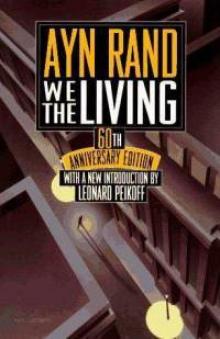 We the Living
We the Living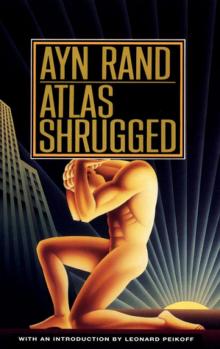 Atlas Shrugged
Atlas Shrugged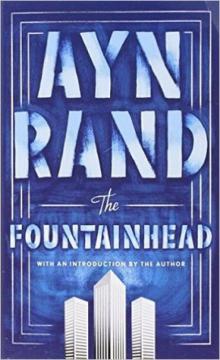 The Fountainhead
The Fountainhead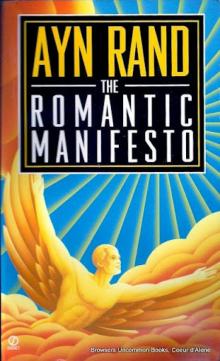 The Romantic Manifesto: A Philosophy of Literature
The Romantic Manifesto: A Philosophy of Literature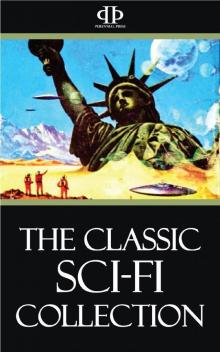 The Classic Sci-Fi Collection
The Classic Sci-Fi Collection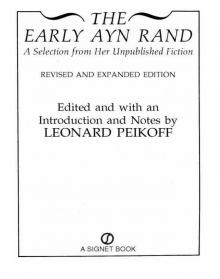 The Early Ayn Rand
The Early Ayn Rand